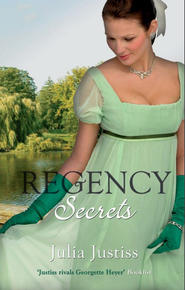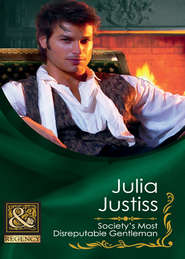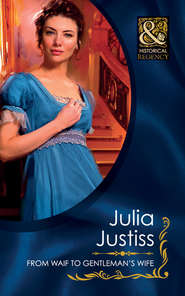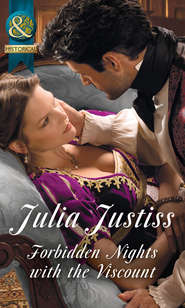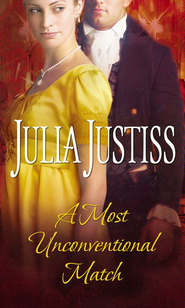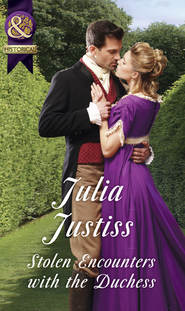По всем вопросам обращайтесь на: info@litportal.ru
(©) 2003-2025.
✖
My Lady's Honor
Настройки чтения
Размер шрифта
Высота строк
Поля
Chapter Five
Chapter Six
Chapter Seven
Chapter Eight
Chapter Nine
Chapter Ten
Chapter Eleven
Chapter Twelve
Chapter Thirteen
Chapter Fourteen
Chapter Fifteen
Chapter Sixteen
Chapter Seventeen
Chapter Eighteen
Chapter Nineteen
Chapter Twenty
Chapter Twenty-One
Chapter One
“Your cousin Nigel—that is, the new Baron Southford, be awaitin’ ye in the library,” the maid informed her with a curtsey.
Gwennor Southford sighed and removed the apron with which she’d covered her mourning gown while she helped Jenny and the staff clear away the remains of the breakfast they’d served after her father’s interment. “Thank you, Jenny. Tell him I will join him shortly.”
While the maid departed, Gwen stopped to check her hair in the black-draped hall mirror, making sure no unruly strands had escaped her coiffeur to catch the eye of her punctilious cousin. A London dandy of the first stare, Nigel never failed to look at her without a slightly pained expression, as if she offended him by sporting soot on her nose or a spot on her gown. Which most of the time, she allowed, she probably did.
Or perhaps it was just that, not being able to peer down at her from a superior height, cousin Nigel tried to intimidate her with his faintly contemptuous gazes. Though they did not succeed in leaving her in awe of him, she did often feel like a large, ugly and not very interesting beetle being inspected under a glass.
Finding that her thick black hair, which had a tendency to curl wildly despite her efforts to subdue it, was still neatly braided, Gwen walked on to the library. She couldn’t imagine what cousin Nigel needed to say to her that could not have been expressed in front of a roomful of other guests.
Perhaps he merely wished to complain—again—about the meals or accommodations. Which, she had no doubt, he would soon be “improving” by the addition of a foreign chef to create dishes more suitable to his cultured palate, followed by an army of workmen to update the century-old rooms to a more fashionable mien.
She grimaced at the idea of her beloved home being transformed under his ruthless hand. Pray God she could convince him to send her to London for the upcoming Season, so she might find a husband and Parry and herself a new home.
Damping down a niggle of unease, she knocked on the library door then entered.
She had to suppress a pang at seeing her cousin lounging in her father’s favorite chair behind the massive desk. Wrenching her thoughts from reflections that could only bring on another wave of useless grief, she curtseyed and forced herself to focus on Nigel.
Once again he subjected her to a lengthy, critical inspection. “Well, cousin Gwennor, I’m afraid the years have not much improved you, but at least you’ve the sense to keep that peasant’s hair tightly braided, and your other features are not unpleasant. I suppose, with the addition of a small dowry, you will do well enough.”
“Thank you, cousin,” Gwen said sweetly with a clenched-teeth smile, “for your kind condolences on my father’s death. And I am…gratified to earn your approval.”
“Your tendency to indulge in levity at inappropriate moments does not become you, Gwennor,” he replied loftily. “I’m quite certain I offered you my sympathies upon my arrival yesterday. However, it does no good to linger in the past. Changes will be taking place at Southford now that I am baron, and you must adapt to them.”
“Naturally, cousin.” She would not refer to him as “my lord,” she thought mutinously, no matter that she was no longer the daughter of the house but merely a female relation dependent on his charity. “Does your reference to my dowry mean that you intend sending me to London for the Season, as I’ve requested? I shall be ready to leave as soon as my bags can be packed.”
She cast her eyes down and clasped her hands in such a picture of maidenly humility that Nigel, no fool despite his affectations, gave her a sharp look.
“I have given thought to your eventual settlement, yes. I think we both agree that it is in neither of our interests that you remain at Southford. After all, the quality of establishment you maintained for your papa, though adequate enough, I suppose, for a Welsh baron of rural tastes, will not do for me.”
“No, cousin, my sort of household—” which, she added silently, would be notable for simplicity, kindness and courtesy to all “—would definitely not suit you.”
“I’m glad we agree on that score. And since with the alterations necessary to bring the manor and outbuildings up to the standards worthy of my stewardship, the estate is likely to suffer some heavy financial demands, I see no reason to throw away money on a London season. You’re well past the age of presentation, no great beauty and your dowry is merely adequate. I do not wish to be unkind, but a dispassionate assessment must conclude that your chances of attracting the eye of a gentleman wealthy and influential enough to make a connection with his family worth the heavy expense of sending you to London are, I regret to say, remote. In this, you must trust my far greater knowledge of the sensibilities of ton gentlemen.”
So used to his disparagement that his strictures scarcely made her wince, Gwen’s active mind considered instead the implications. Not London. Would he send her to Bath, perhaps? Or to the Assembly in Gloucester?
“It was to announce my solution to this delicate dilemma that I summoned you. Of course, I am fully sensible that as a Southford and my cousin, you must wed a man of good reputation and standing, if not one as discriminating in his requirements as I am myself. I have chosen such a husband for you, cousin. You may congratulate yourself on soon becoming the bride of Lord Edgerton.”
Shock riveted her to the spot. “Edgar Edgerton, B-Baron Edgerton?” she stuttered, hoping there might be some misunderstanding.
“Indeed,” the new Lord Southford replied, smiling benevolently. “I can see how overwhelmed you are by my choice. Lord Edgerton may be a trifle older than you, but he is still a fine figure of a man, and his six motherless sons, poor lads, will give you ample opportunity to practice your preferences for frugality and a rustic outdoor life.”
Gwen swallowed hard. Edgar Edgerton, a hunting crony of Nigel’s, was pushing fifty, with a short, stout figure and high coloring that indicated a probable tendency to gout. He resided all year on his estates in Lincolnshire, having, as far as Gwen knew, few interests beyond his stables and his kennels. There would certainly be no need to expend Southford estate money on modish gowns for her trousseau, she thought acidly.
“I…I have heard by all reports that Lord Edgerton is a most…amiable gentleman,” she said with only a slight quaver in her voice. “But I am somewhat concerned about his sons, whom rumor would hold to be a bit…spirited.” In truth, the alarming escapades indulged in by the baron’s energetic offspring, descriptions of which had been brought back to Southford by her father when he hunted with the baron’s pack the previous year, had made even as indulgent a gentleman as her papa shake his head in dismay. “I hope they will not be too rough with Parry.”
Her cousin had been listening idly, his attention focused on removing a barely visible speck of lint from the sleeve of his immaculate coat of black superfine, but at this his fingers stilled. “Parry?” he said with a frown. “What has that half-wit to do with this?”
“Well, naturally I assumed that since you do not…get on with Parry, he would go with me when I married.”
“Whatever would cause you to believe such nonsense as that?” her cousin demanded, his tone aggrieved. “Use what little wit you possess, Gwennor. For one thing, your father long ago designated me as the boy’s guardian after his death. Even though he’s not a blood relative, I am not one to shirk a duty, no matter how distasteful. Besides, Lord Edgerton, who prides himself upon the bloodlines of his breeding stock, could never abide having that degenerate about, no more than would any other person of sensibility.”
“Parry is no degenerate,” Gwen replied hotly, “and he possessed more wit than you until that stallion kicked him!”
Nigel looked at her with cold eyes. “I shall forgive you that remark only because I know you still harbor some ridiculous conviction that, since Parry was injured going to your defense, you are obligated now to defend him. But do not trespass too far upon my goodwill. I grant you, so devastating an accident occurring to a child of his tender age was tragic, but ’tis long past time to be done with such sentimentality. He’s now—eighteen, is he not? He should have been confined years ago, instead of being allowed to wander the woods and fields of Southford, an embarrassment to the family and a threat to the countryside.”
“Parry is no threat to anyone!” Gwen protested. “He treats every fellow creature with consideration! And he’s not an embarrassment—everyone at Southford knows and appreciates him.” Save you, she thought furiously.
“Not an embarrassment?” Nigel retorted. “And what would you call it when he interrupted the solemnity of your father’s obsequies, stumbling into the church in dirty boots and a torn jacket, his pocket full of wild creatures!” He made a grimace of repulsion.
“Baby rabbits,” Gwen replied, trying to hold back the tears that threatened. “Papa was developing a new domestic strain, you’ll remember, and interbreeding them with the darker-colored wild rabbits from the mountains. Parry brought him those as a parting gift.”
“Gift—bah!” Nigel said contemptuously. “That drooling simpleton had no idea the man who’d died was his stepfather—nor any conception of what death means. Although he’s soon to get a lesson in the latter.”






